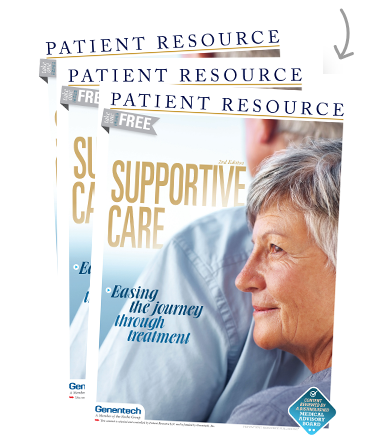Diarrhea
Diarrhea is the passing of loose or watery stools three or more times a day. It may also be accompanied by cramps in the abdomen and pain or discomfort in the rectum. When mild, diarrhea is an inconvenience, but left untreated, it can lead to serious problems, such as dehydration, loss of important nutrients, weight loss and fatigue.
What causes diarrhea?
Causes may include treatment, the cancer itself, certain foods, and conditions and medications not related to cancer.
Treatments that can cause diarrhea include chemotherapy, immunotherapy, targeted therapy, radiation therapy to the pelvis, surgical removal of a part of the bowel, and Graft-versus-Host Disease, a side effect of bone marrow/stem cell transplantation.
Cancers that affect the pancreas, colorectal cancer and neuroendocrine tumors of the gastrointestinal tract can cause diarrhea.
Other conditions and medications that may lead to diarrhea include:
- Antibiotics
- Infection with Clostridium difficile, a bacterium also known as C. diff
- Inability to digest certain foods
- Infection with other bacteria
- Irritable or inflammatory bowel disease
- Viral infection
When does diarrhea occur?
Treatment-related diarrhea is usually a short-term side effect that typically occurs within the first few days or weeks after treatment and typically resolves within a few weeks after the end of treatment.
How you can manage diarrhea
Following a bland diet can help prevent or lessen diarrhea. Once diarrhea occurs, switching to only clear liquids may help the lining of your intestines heal. Clear liquids include water, cranberry juice, ginger ale, clear broth, popsicles, decaffeinated tea and gelatin. As diarrhea begins to improve, you can slowly add solid foods to your diet, starting with low-fiber foods (such as white rice or noodles).
When you have diarrhea, your body loses fluid and important minerals. Drink plenty of clear liquids to help replace fluids in your body. Eat foods that are high in potassium, such as spinach and bananas, as this important mineral is often lost during diarrhea.
Over-the-counter medicines are available to control diarrhea, but be sure to consult your medical team before taking them. If diarrhea is severe, a prescription may be necessary.
Severe diarrhea may cause discomfort in the rectal area. To help soothe the area, clean the external rectal area with warm water and soap after bowel movements, soak in a warm bath or use a water-repellent cream.
Suggestions to help prevent and control diarrhea:
- Drink six to eight glasses of fluid per day.
- Avoid beverages with alcohol or caffeine, such as beer, wine, cola, coffee and tea.
- Eat bland, low-fiber foods, such as white rice, boiled chicken, noodles and bananas.
- Eat foods high in protein, calories and potassium that are easy to digest, such as eggs, baked potatoes, cooked cereals, bananas, macaroni and pasta, white toast, applesauce, apricots, crackers, pretzels and smooth peanut butter.
- Eat more frequently but in smaller amounts.
- Avoid foods that are high in fat, including fried or greasy food and cream sauces.
- Avoid food that can irritate the digestive tract, such as milk products, chocolate, dried fruits, beans, popcorn, or spicy, greasy or fried food.

When to call your health care provider
Talking about diarrhea may seem embarrassing, but it is important to control diarrhea to avoid complications. Ask about your risk for it before treatment begins and share what your normal bowel regimen is. For example, if you have a history of irritable bowel syndrome (IBS), your health care provider may start you on an anti-diarrheal medication sooner, rather than waiting for diarrhea to strike.
Consult with your health care provider before taking over-the-counter medications and again if your diarrhea does not improve with them, especially if you have recently been taking antibiotics. Call if you experience any of the following:
- Six or more loose bowel movements per day for more than two days in a row
- Blood in the stool, around the anal area, on the toilet paper, or in the toilet bowl
- Inability to urinate for at least 12 hours
- Signs of a fever
- Loss of five pounds or more after the diarrhea starts
- A swollen and/or painful abdomen
- Dizziness or light-headedness when moving to a standing position



